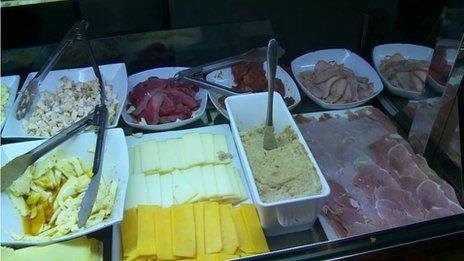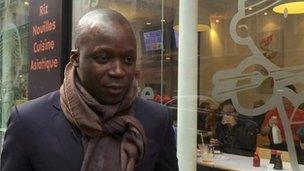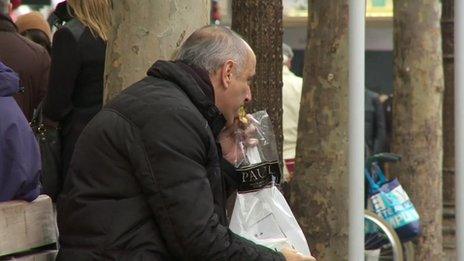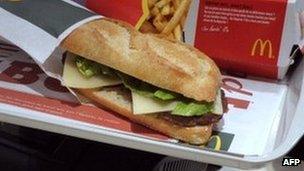Why the French are turning to fast food
- Published

A baguette to go is quicker and cheaper than a meal in a brasserie
From escargots to coq au vin to tarte tatin, no country has a greater affinity with food than France.
But last year 54% of total restaurant turnover in this country went to fast food and sandwich shops. It's the first time "convenience" food has outstripped the market of the traditional French brasserie.
Balthazar de la Borde opened his sandwich shop Balt four years ago. Through every year of the eurozone crisis, his takings have been growing.
"I suppose we are a business for the crisis," he says.
"We are not your normal sandwich shop," he adds hurriedly. "We do cook a lot of things on site - today it's pork fillet from Pays Basque - and all these cheeses are carefully chosen.
"But it's good quality food - at low prices. In the beginning the majority of our customers were assistants, trainees, the lower paid - nowadays we get the middle managers, the 'higher-ups' who come here whenever they are not entertaining."
Lunch at the desk
In years gone by the French would go home to eat at lunchtime.

Charles Mendy says he could take a longer lunch break but would then have to stay later in the office
But with the ever increasing strains on French income - it's easier, and cheaper, to eat at the desk.
Charles Mendy is the typical French businessman.
Most days he will take 20 minutes for his lunch, and normally he will eat it in the office - though it's not all about the money.
"We do have a kitchen in the office," says Charles. "And sometimes I'll eat my lunch there - but more often than not I eat it in front of the computer.
"I used to take an hour for lunch. Now… the workload is too big."
So is it an unspoken pressure that comes from the employer?
"No, I could take an hour if I wanted but I would have to stay longer to finish in the evenings," he says.
"The working day has changed. My company is American. We work and interact with colleagues in New York who are starting their day when we are at lunch - I think habits have changed to reflect the global nature of our business."

Grabbing a bite: Many people eat lunch when and where they can
'Salad and water'
Balthazar agrees, though some of it, he says, must come down to how much people have in their pocket.
"People used to go home to eat - now they can't afford, they don't have the time, they lead highly pressured lives.
"Our prices have risen over the four years we have been open - but it doesn't seem to affect the level of business.
"What it does affect is what people choose. We offer a set menu, a salad, a dessert, a drink. Now some just take a salad - and they'll eat it with a glass of water."
Underpinning that pressure to work more is most certainly the fear of unemployment.
In France the number of people out of work is at a record high.
"There's a fear of the unknown," says Balthazar. "I think it underpins that willingness to work harder."
Cheap and convenient
The French are also paying more in taxes. In 2009 they paid 46bn euros (£38.5bn; $62bn) in income tax; in 2013 it will rise to 70bn euros (£59bn; $95bn).
Consumers have been hit hard.
"Spending habits have changed dramatically," says Armand Chaigne, from Eurogroup Consulting, who has been studying recent consumer trends.
Ten years ago one in five lunches would be eaten out, he says. Today it's one in three.
"It marks the shift to cheap convenience food. Today the fast food industry is two and a half times bigger than it was 20 years ago."
'Lost in the middle'
Mr Chaigne says the shift in trends is comparable with the fashion industry - another sector for which the French are well-known.

McDonald's trialled a "McBaguette" in France last year
"These days a woman might buy her black trousers at Chanel but she will probably buy her black T-shirt from Zara," he says.
"We choose value for money. In the same way people will eat out at a top restaurant, say once a fortnight - but they'll save for that dinner by eating cheaper lunches through the week.
"That spells trouble for the traditional brasserie. Their food is good but it's not great, the service is OK but it's not fantastic, it takes an hour to sit down and eat. They are lost somewhere in the middle of the trend - and they are losing out."
The figures back that up. In July the number of people dining in restaurants fell by a record 13% on the same period last year.
Today French people are making tough choices on when and where they sit down to eat.
That's not to say the French taste for fine dining has been completely extinguished. Let's face it - the food is far too good.
But for most the two-hour lunch is an increasingly rare event. These days it's more often the bargain baguette.
- Published22 October 2013
- Published21 August 2013
- Published5 July 2013